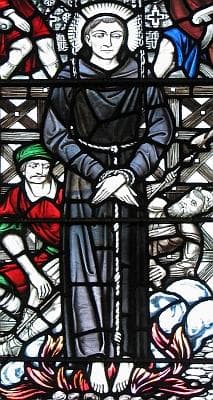
Blessed John Forest
Blessed
Feast Day: May 22
Death: May 1, 22
Biography
Blessed John Forest, also known as John Forrest, was born in 1471 in Oxford, England. As a young man, he joined the Friars Minor of the Regular Observance at Greenwich, England, in his late teens, dedicating his life to the Franciscan order. He went on to study theology at the Franciscan College at Oxford, earning the title of "Doctor," although records of his degree have not survived.
John Forest emerged as a prominent figure within the Catholic Church, becoming a priest and serving as a royal chaplain. By 1525, he had risen to the position of Provincial of the Franciscans, demonstrating his leadership skills within the order. It was during this time that he confronted opposition to Cardinal Thomas Wolsey's legatine powers and even threatened excommunication to those who opposed him.
A significant moment in Forest's life came when he became the confessor to Queen Catherine of Aragon, the wife of King Henry VIII. In 1529, he believed he had persuaded the king not to suppress his Order in response to their opposition to Henry's divorce. However, when King Henry did not receive the desired outcome, he suppressed the Order and subsequently arrested John Forest.
Records indicate that John continued to preach against the state's actions of tearing down churches in November 1532. Because of this, authorities closely monitored his activities. In 1534, he was arrested and imprisoned in Newgate prison. Despite his confinement, he managed to establish a correspondence with Queen Catherine and another blessed individual named Thomas Abel.
During his imprisonment, John Forest wrote a treatise against King Henry's usurpation of power over spiritual matters, affirming his unwavering commitment to the Catholic Church. However, this would ultimately lead to his sentencing. On 8 April 1538, he was condemned to death for refusing to take an oath acknowledging Henry's primacy in religious affairs.
John Forest met his martyrdom on 22 May 1538 at Smithfield, England, where he was hanged and burned to death. Interestingly, a wooden statue of Saint Derfel, which was taken from a local church, was used in the fire as a means to fulfill a local prophecy claiming that the statue's burning would destroy a forest. Some believe that John's relics may still be hidden in Smithfield, a location that holds reverence for his sacrifice.
Recognizing the holiness and devotion displayed by John Forest, Pope Leo XIII beatified him on 29 December 1886. He is commemorated on 22 May and also on 1 December as one of the Martyrs of Oxford University, a testament to his connection with the academic institution where he studied theology.